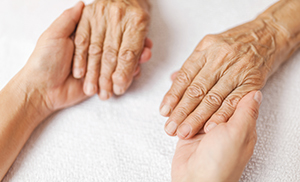An 80-Year-Old Daughter Caring for Her 106-Year-Old Mother

According to Statistics Canada, the number of Canadians aged 100 and above more than tripled between 2000 and 2023—from 3,393 to 11,705—making centenarians the fastest-growing age group in the country. In Toronto’s west end, May, now 80, is the primary caregiver for her 106-year-old mother, who still lives at home.

“I used to feel nauseated at the sight of urine or feces—it was disgusting to me. But now, when my mother loses control, I clean up without gagging. I don’t know why—maybe it’s because I care deeply for her.”
Born in China, raised in Indonesia, and immigrated to Canada from Hong Kong 58 years ago, May is the second of four siblings. She has never married and has always lived at home. Her daily routine begins at 9:30 a.m., when she wakes her mother, helps her to the toilet, cleans her up, and offers a glass of cranberry juice. She then brings her out for breakfast and light exercise. Around 11:30 a.m., her mother naps until 1:15 p.m., when May assists with bathing—mainly supporting the personal support worker (PSW) who visits three times a week. Lunch is served at 2 p.m., followed by another bathroom visit and an afternoon nap. During this time, May prepares dinner. At 6:15 p.m., she wakes her mother for the evening meal, and her caregiving duties usually wrap up by 10 p.m. If there’s a bowel accident, however, she may be up until 1 a.m. cleaning clothes and bedding.
Behind this demanding schedule is May’s personal wellness philosophy:
“She’s awake about seven hours a day. I don’t let her sleep too much—too much sleep isn’t good for the body. I make sure she gets up and moves around. In the morning, I give her juice to help with her eczema. At night, I prepare a cup of New Zealand honey water to soothe her dry mouth, since she sleeps with her mouth open.”
May cooks all her mother’s meals and feeds her personally. She also massages her mother three times a day to help with bowel movements and eczema.
“I want her to have a bowel movement at least once every three days. If not, she has to take medication, which is tough. I learned the massage techniques online.
I make sure she has the ‘Five Essentials’—she can sleep, eat, drink, urinate, and defecate.”
“I’m doing okay, I suppose. But I’m still tired and in pain every day. That’s just how it is—getting older means shrinking. I’m under five feet tall, and my mother weighs 100 pounds. I have to lift and support her, so my shoulders hurt a lot. I always tell her, ‘Mom, you have to help me—I can’t do this alone. I’m 80 years old.’”
May spent her career in financial management at a corporate chain and had no prior experience caring for the elderly. Her caregiving journey began after retirement and has continued for over a decade—learning as she goes, adapting to her mother’s changing needs.
In addition to handling most tasks herself, May receives support from government-assigned PSWs and pays privately for additional help.
“The government provides 32 hours of overnight care across four nights, and 23 hours of daytime care per week. But I still have to clean the house, cook meals, and run errands. My mother needs overnight supervision—she gets up to use the bathroom on her own, and there have been several falls that led to hospital visits. So I hire someone privately for three more nights, and my brother comes over in the mornings while I get ready.”
Despite the help, May acknowledges that hiring and managing caregivers is challenging. Yet she expresses no resentment toward the demands of round-the-clock care.
“I don’t feel unhappy about it. Some people aren’t willing to give up their own lives, but I’m willing—because she’s my mother. We’ve been together for 80 years. She was still traveling with me on cruises at age 97.”
Caring for her mother personally was a deliberate choice.
“I never considered sending her to a nursing home—I wouldn’t feel at ease. I told her, ‘You’re most comfortable at home.’ But when it’s my turn, I hope to enter a private care facility.”
May describes herself as a tough person. Her father passed away at home from kidney failure, and in his final days, she performed dialysis for him every night—losing 15 pounds in the process.
“No matter how hard it was, I did it. So when my father passed away, even though I was heartbroken, I didn’t shed a single tear.
Whatever needed to be done, I’ve already done it—and I’ve done it the best I could.
The same goes for my mother.” Shirley Chan
Shirley Chan





